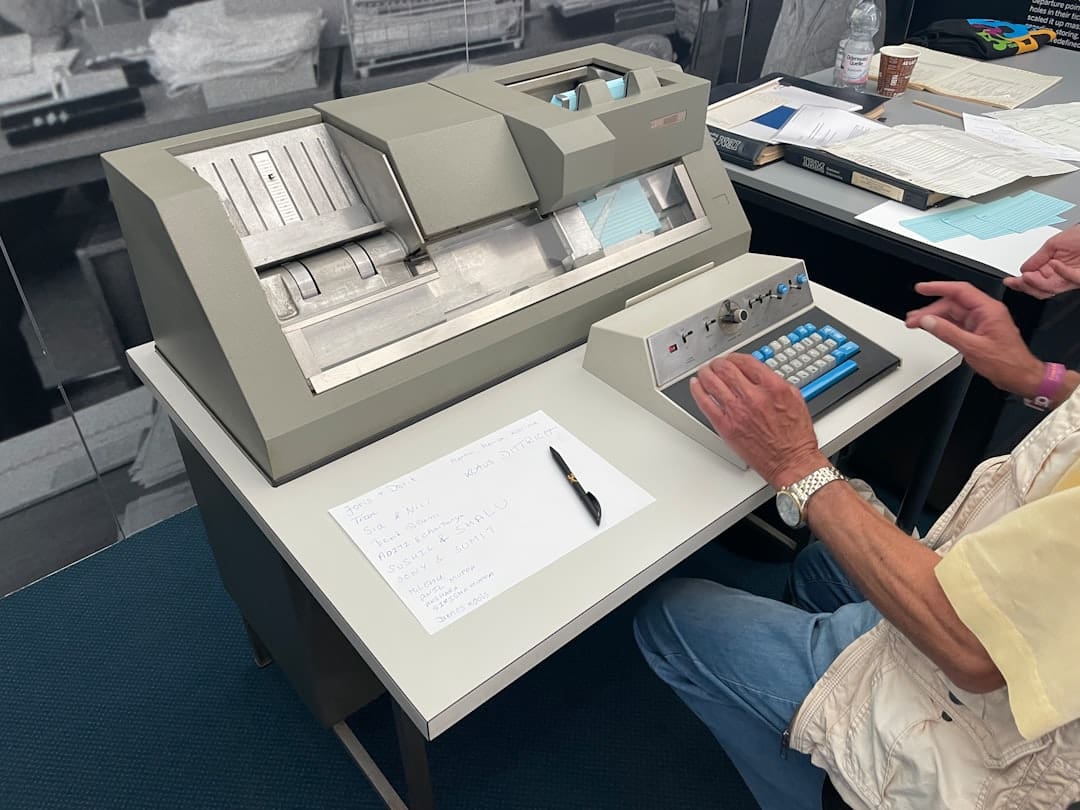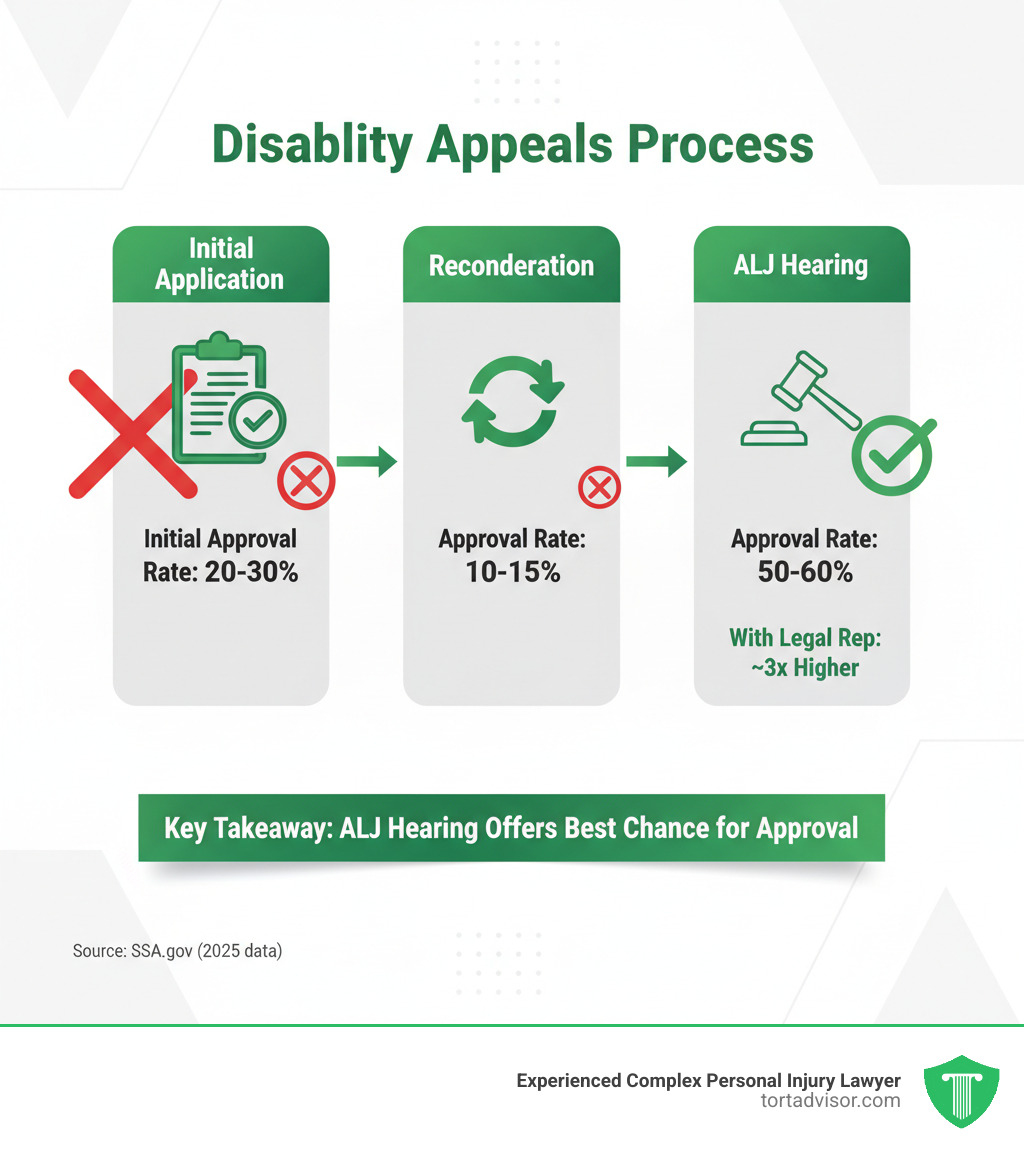


Why Your Disability Hearing is a Critical Opportunity
Disability hearing tips can make the difference between securing the benefits you need and facing another denial. While nearly 80 percent of initial disability applications are denied, the hearing stage offers your best chance for approval. About half of all claimants win benefits at their hearing, and those with legal representation see even higher success rates.
Your disability hearing is a formal meeting with an Administrative Law Judge (ALJ) who will review your case with fresh eyes. Unlike the initial reviewers, the ALJ can ask you questions directly and hear your testimony to understand how your condition truly affects your ability to work.
Quick Disability Hearing Tips:
- Submit all evidence at least 5 business days before your hearing.
- Include updated medical records and doctor’s statements about your limitations.
- Prepare honest, specific answers about your daily life and work history.
- Speak clearly, be respectful, and address the judge as “Your Honor.”
- Don’t exaggerate or minimize your symptoms.
- Consider legal representation, as claimants with lawyers are 3 times more likely to win.
The hearing typically lasts about an hour. You’ll answer questions about your medical conditions, work history, and daily activities. While the process can feel intimidating, proper preparation dramatically increases your chances of a favorable decision. This is your opportunity to tell your story and demonstrate why you cannot work.
I’m Mason Arnao, and while my primary expertise is in technology and digital marketing, I’ve researched and compiled these disability hearing tips from extensive legal resources to help you steer this critical stage of your claim.
Disability hearing tips terms simplified:
- Denied disability claim
- Disability claim assistance
Essential Disability Hearing Tips: A Step-by-Step Preparation Guide
Your Social Security Disability hearing is your best opportunity to get the benefits you deserve. With the right preparation, you can walk into that hearing feeling confident and ready. These disability hearing tips will help you do exactly that.
Step 1: Gather and Submit Your Crucial Evidence
The judge’s decision will be based almost entirely on the evidence in your file. Gathering and submitting it properly is one of the most important disability hearing tips you’ll receive.
First, request your SSA file to see what the judge will see. Review it for errors and missing information, like an important MRI that was never submitted. These problems won’t fix themselves.
Next, gather updated medical records from every doctor, specialist, and therapist you’ve seen. This includes office notes, test results, and hospitalization records. Doctors cannot charge you for records requested to support an SSI or SSDI claim.
Medical records alone aren’t always enough. Ask your doctors to provide detailed statements or complete Residual Functional Capacity (RFC) forms. These documents should explain your diagnosis, prognosis, and specific limitations (e.g., “can only lift 5 pounds,” “must lie down after 30 minutes of sitting”).
Witness letters from family, friends, or former employers can also be powerful. They can describe how your disability affects your daily life in ways medical records can’t. A letter from a former supervisor describing your declining work performance is especially valuable. The Work Activity Questionnaire can help organize this information.
Crucial Timing: You must submit all evidence at least five business days before your hearing. It’s best to submit everything at least a month early. You can mail or fax documents to the Social Security hearings office handling your case. Always keep copies and proof of submission, like a certified mail receipt.
Step 2: Understand the Power of Legal Representation
Claimants with a lawyer are three times as likely to win benefits. An experienced disability lawyer knows what the judge needs to see and how to present your case in the strongest possible light.
A lawyer will analyze your case, gather missing evidence, work with your doctors to get strong statements, and prepare you for the judge’s questions. During the hearing, they can cross-examine experts and present legal arguments on your behalf. They handle all the administrative tasks so you can focus on your health.
Many people worry about the cost, but disability attorneys work on a contingency fee basis. They only get paid if you win. The fee is capped at 25% of your back benefits, with a maximum of $7,200 in 2024. You pay nothing upfront. This makes quality legal help accessible to everyone.
For comprehensive Disability Claim Assistance and to connect with experienced attorneys, reach out to us at Tort Advisor.
Step 3: Prepare for Your Specific Hearing Format
Your hearing may be in person, by video, or over the phone. Most are now remote, but you can request an in-person hearing if your disability makes remote participation difficult. Contact your local Social Security hearing office to make this request.
- For in-person or video hearings at an SSA office: Arrive about 30 minutes early to find the room and settle your nerves.
- For phone or video hearings from home: Find a quiet, private space where you won’t be interrupted. Arrange for childcare or pet care. Test your technology—camera, microphone, and internet connection—beforehand. Ensure your phone is fully charged and you have good service.
- What to wear: Dress in smart-casual attire. Neat, comfortable clothes show respect for the process, even on a phone call.
During the Hearing: Navigating the Process and Your Testimony
This is your moment to tell your story directly to the decision-maker. These disability hearing tips will help you steer the process with confidence.
The Hearing Room: Who’s Who and What to Expect
A disability hearing is more like a serious conversation than a trial. It’s generally informal and lasts about an hour.
- The Administrative Law Judge (ALJ): The impartial decision-maker who will ask most of the questions.
- You (the claimant): Your testimony is the central piece of evidence.
- Your Attorney: Your advocate, who will guide you, present arguments, and question experts.
- A Hearing Assistant: Records the audio of the proceeding. You must speak clearly and say “Yes” or “No” rather than nodding.
- Vocational Expert (VE): An impartial specialist who testifies about job requirements and availability.
- Medical Expert (ME): Less common, but may be called to give an opinion on your medical condition.
The hearing begins with introductions, after which you’ll be sworn in. The judge will then question you about your condition, work history, and daily life. Your attorney will have a chance to ask clarifying questions and make a closing statement.
Answering Questions: Key Tips for Your Disability Hearing Testimony
Your testimony is critical. The judge needs to hear directly from you how your disability impacts your life.
- Be Honest: Your credibility is everything. Don’t exaggerate or minimize your symptoms. Tell the truth about good days and bad days.
- Describe a “Typical” Day: When asked about daily activities, don’t describe your best or worst day. A realistic middle ground gives the judge an accurate picture.
- Use Specific Examples: Instead of saying “I have a lot of pain,” say “My back pain is a sharp, burning sensation. I can’t stand for more than 15 minutes without needing to sit down.”
- Discuss Your Work History: Explain your past job duties and why your condition prevented you from continuing to work.
- Explain Symptoms and Side Effects: Go beyond diagnoses. Describe the nature, frequency, and duration of your pain. Mention any side effects from medication, like drowsiness or an inability to concentrate.
- Detail Daily Activities (ADLs): Explain how your condition impacts personal care, chores, shopping, and hobbies. Mention if you need help with these tasks.
- Provide Genuine Estimates: For physical limitations, give concrete estimates of how long you can sit, stand, walk, or lift in a work-like context.
- Describe Mental Limitations: If you have mental health conditions, explain how they affect your concentration, memory, ability to follow instructions, or cope with stress.
Common Mistakes to Avoid: More Tips for Your Disability Hearing
Knowing what not to do is just as important as knowing what to do.
- Don’t interrupt the judge or your attorney. Wait for them to finish their question.
- Speak clearly and loudly enough for the audio recording.
- Be polite and respectful. Address the ALJ as “Your Honor.”
- It’s okay to say “I don’t remember” or “I don’t know.” It’s better than guessing.
- Ask for clarification if you don’t understand a question.
- Request a break if you feel overwhelmed or are in pain.
- Avoid absolutes like “always” or “never.” Use words like “usually” or “rarely.”
- Don’t discuss financial hardship. The decision is based on medical disability, not financial need.
- Answer only the question asked. Don’t volunteer extra information.
- Don’t argue your case. Your role is to provide facts; your attorney will make the legal arguments.
For more guidance, visit our page on what to do if you have a Denied Disability Claim.
After the Hearing: Understanding the Decision and Your Next Steps
The hearing is over, and now the waiting begins. This final set of disability hearing tips covers what happens next.
When Will You Get Your Decision?
ALJs do not announce their decision at the hearing. You will receive a written decision in the mail, typically within 60 to 90 days, though it can sometimes take longer. Be patient and continue your medical treatment while you wait.
Understanding Your Written Decision
Your decision will be one of three outcomes:
- Fully Favorable: The ALJ agrees you are disabled as of your alleged onset date, and you are entitled to full benefits.
- Partially Favorable: The ALJ agrees you are disabled but has changed your onset date. This means you will receive ongoing monthly benefits but may receive less back pay.
- Unfavorable: The ALJ has denied your claim. This is disappointing, but it is not the end of the road.
What About Back Pay?
If your claim is approved, you will receive “back pay” for the months you were owed benefits while your case was pending. The amount depends on your onset date and how long the process took. Our SSDI Benefit Calculator can help you estimate what you might receive.
If You’re Denied: Your Appeal Options
A denial at the hearing level is not final. You have several options:
- Appeal to the Appeals Council: You have 60 days to file this appeal. The Council reviews the ALJ’s decision for legal errors and can send your case back for another hearing.
- File a Lawsuit in Federal Court: If the Appeals Council denies your request, you can take your case to the federal court system.
- File a New Application: In some cases, especially if your condition has worsened, filing a new application may be the best option. Discuss this with an attorney first.
Navigating the post-hearing phase is complex. An attorney can advise you on the best course of action based on the specifics of your case.
Frequently Asked Questions about Disability Hearings
Here are some answers to common questions, providing additional disability hearing tips to ease your mind.
What are the key differences between an SSDI and an SSI hearing?
When it comes to the hearing itself, there is very little difference. Social Security Disability Insurance (SSDI) is based on your work history, while Supplemental Security Income (SSI) is a needs-based program for those with limited income and resources.
However, the medical eligibility standard is exactly the same for both programs. The ALJ’s focus will be on whether your medical condition prevents you from working. For an SSI claim, the judge may briefly confirm your financial situation, but the vast majority of the hearing will center on your medical evidence and testimony. The tips in this guide apply equally to both SSDI and SSI hearings.
What should I do if I miss my hearing?
Missing your hearing is serious and can lead to your case being dismissed. If you know you are going to miss it, or as soon as you realize you have, contact the hearing office immediately. You can find the contact information on your Notice of Hearing letter or by using the hearing office locator.
You must provide a “good cause” for your absence, which means a significant and unavoidable reason like a medical emergency, a death in the family, or a car accident. You will need to submit your explanation in writing with supporting documentation (e.g., a doctor’s note). If the ALJ accepts your reason, your hearing will be rescheduled. If not, your case may be dismissed.
How can I ensure my medical records are properly submitted and considered?
The ALJ can only consider evidence that is in your file. Follow these steps to ensure your records are included:
- Submit evidence early. The deadline is five business days before the hearing, but it’s best to submit everything at least a month in advance.
- Send documents to the correct office. All evidence should go directly to the Social Security hearings office handling your case. The address and fax number are on your hearing notice.
- Keep proof of submission. Use certified mail for a receipt or keep your fax confirmation page.
- Follow up to confirm receipt. A few days after sending your documents, call the hearing office to verify they have been added to your file.
An experienced disability lawyer will manage this entire process for you, ensuring nothing falls through the cracks.
Conclusion: Secure Your Benefits with Expert Guidance
You now have a solid foundation of disability hearing tips to steer this critical process. Preparing for a Social Security Disability hearing requires organization and energy, but it is your best opportunity to win the benefits you need and deserve.
Gathering evidence, preparing honest answers, and presenting yourself professionally are the building blocks of a successful claim. Being prepared empowers you to tell your story in a way the Administrative Law Judge can truly understand.
Statistics show that while most initial applications are denied, about half of claimants win at the hearing stage—and your chances are three times higher with legal representation. Experienced disability attorneys know what evidence an ALJ needs and how to present your case in the strongest possible light.
That’s where we come in. At Tort Advisor, we connect people just like you with top-rated specialty attorneys who have proven track records in disability cases. We partner exclusively with highly skilled professionals who know how to steer the complexities of the Social Security Administration and fight for the outcomes their clients deserve.
Whether you’re in Alabama or Wyoming, Chicago or Miami, our network of experienced legal professionals is ready to stand beside you. If you’re preparing for your hearing or facing an unfavorable decision, you don’t have to figure it out alone. Let us help you take the next step toward securing your future.
Free Confidential Case Evaluation
Complete the short form below to get an immediate FREE case review with an expert in your specific claim. Don't wait, your case could be time sensitive to file a claim.
Related Posts
Did a North Dakota product cause harm? Understand product liability, your rights, and how to take action for defects.
Get justice for clergy abuse. Find an expert Priest abuse lawyer to navigate complex laws and hold institutions accountable.
Diagnosed with meningioma after Depo-Provera? Understand potential Depo-Provera lawsuit settlements, risks, & how to claim compensation.
Uncover the truth about uber sexual assault cases. Learn about the alarming scale, Uber's accountability, and legal options for justice.
Facing wildfire losses? Discover the best wildfire lawsuit attorneys in California to fight for your full recovery and justice.
Exposed to Roundup & diagnosed with NHL? Discover how to sue Monsanto, understand eligibility, & seek compensation. Your guide to justice.









